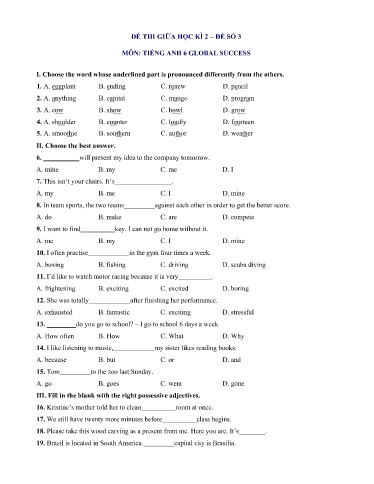Đề thi giữa học kì 2 Tiếng Anh Lớp 6 Global Success - Đề 3 (Có đáp án)
Bạn đang xem tài liệu "Đề thi giữa học kì 2 Tiếng Anh Lớp 6 Global Success - Đề 3 (Có đáp án)", để tải tài liệu gốc về máy hãy click vào nút Download ở trên.
Tóm tắt nội dung tài liệu: Đề thi giữa học kì 2 Tiếng Anh Lớp 6 Global Success - Đề 3 (Có đáp án)

20. A: Is that the Smiths’ car? That one over there - the blue one. B: No, that’s not . car is dark blue. IV. Listen and choose True or False. 21. Sumo is not the national sport of Japan. 22. Its popularity is increasing. 23. Sumo is misunderstood around the world. 24. People also say the guys who battle against each other are wrestlers. 25. Sumo is incredibly exciting and skilful. V. Read the passage carefully and choose the correct answer. At the beginning of TV history, there were several types of TV technology. One system was a mechanical model based on a rotating disc. (Rotating discs are discs that spin like CDs.) The other system was an electronic model. In 1906, Boris Rosing built the first working mechanical TV in Russia. In the 1920s, John Logie Baird in England and Charles Francis Jenkins in the United States demonstrated improved mechanical systems. Philo Taylor Farnsworth also showed an electronic system in San Francisco in 1927. His TV was the forerunner of today's TV, which is an electronic system based on his ideas. Now TV is everywhere. Before 1947, there were only a few thousand televisions in the U.S. By the 1990s, there were televisions in 98% of American homes. 26. Rotating means A. going up and down. B. going back and forth. C. spinning. D. staying still 27. Who invented the mechanical TV model? A. Boris Rosing B. John Logie Baird C. Charles Francis D. Philo Taylor Farnsworth 28. Which of the following statements is wrong? A. More than one TV technology was developed in the history. B. Nowadays TV is a popular household equipment. C. John Logie Baird and Charles Francis Jenkins invented an electronic TV based on the previous mechanical one. D. No inventors mentioned in the passage came from Asia. 29. Whose invention is the current TV mostly based on? A. Boris Rosing B. John Logie Baird C. Charles Francis Jenkins D. Philo Taylor Farnsworth 30. How many TVs were in the US in 1945? A. A few hundred B. A few thousand. C. A few million. D. A few billion. VII. Choose the best answer to complete the passage.
File đính kèm:
 de_thi_giua_hoc_ki_2_tieng_anh_lop_6_global_success_de_3_co.pdf
de_thi_giua_hoc_ki_2_tieng_anh_lop_6_global_success_de_3_co.pdf đáp án đề thi giữa kì 2 -đề 3.pdf
đáp án đề thi giữa kì 2 -đề 3.pdf

